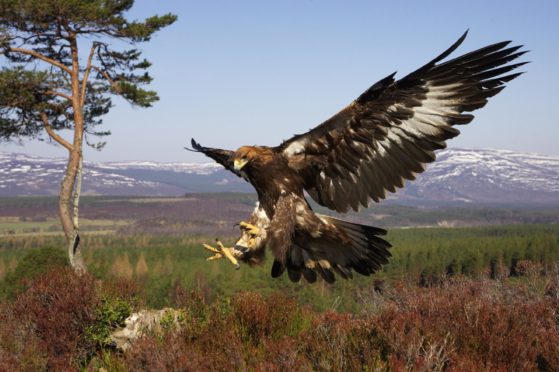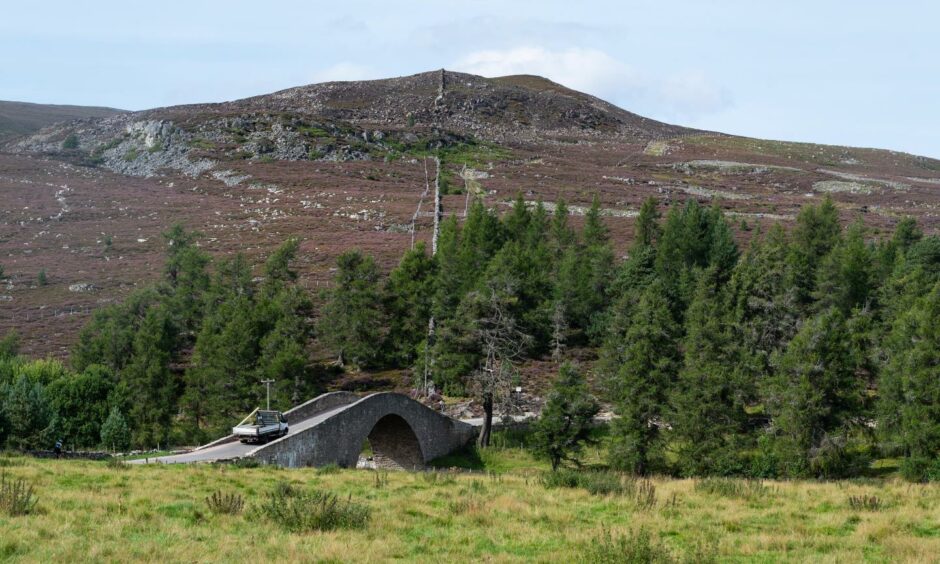A Cairngorms estate has been sanctioned after an investigation into the poisoning of a golden eagle.
NatureScot has restricted the use of general licences on part of the Invercauld Estate, which neighbours the Queen’s Scottish home at Balmoral.
The decision, it said, was made on the basis of evidence provided by Police Scotland of wildlife crime against birds, including a poisoned golden eagle found on the estate in last March.
An investigation was launched after the bird, which was less than a year old, was found on March 19 on a hillside near Crathie.
The eagle was found along with a rabbit and a hare carcass that had been laced with pesticide, and tests later showed the raptor had been illegally poisoned.
Poisonings were ‘appalling’
General licences permit authorised persons to carry out actions that would otherwise be illegal. They allow landowners or land managers to carry out control of common species of wild birds, such as crows and magpies, to protect crops or livestock, without the need to apply for an individual licence. They are subject to strict conditions, however, and failure to comply with these can constitute an offence.
The restriction will apply to the Gairnshiel and Micras moor on the estate, where the evidence of poisoning was found, and will apply for three years.
A spokesman for Invercauld Estate stressed there was no suggestion the poisioning had anything to do with its staff, and said they are considering appealing the restrictions.
He added the estates team “abhors wildlife crime in any form”.
Donald Fraser, NatureScot’s head of wildlife management, said: “These poisoning incidents are appalling and an act of animal cruelty.
“The indiscriminate use of poisons is not only lethal to our iconic Scottish wildlife, but can also pose a serious health risk to people and domestic animals that come into contact with it.
“We are committed to using all the tools we have available to tackle wildlife crime. In this case, there is clear evidence of criminal behaviour. Because of this, and the risk of more wildlife crimes taking place, we have suspended the use of general licences on this property for three years.
“They may still apply for individual licences, but these will be closely monitored. This measure will help to protect wild birds in the area, while still allowing necessary land management activities to take place, although under tighter supervision.”
Restriction is a ‘proportionate’ response
Mr Fraser said that NatureScot works closely with police to tackle wildlife crime, and will consider all information presented that may warrant restricting general licences.
The agency has imposed the restrictions on Leadhills Estate, South Lanarkshire – which has been recently extended to July 2023 – and Lochan Estate in Perthshire, which expires in January 2025.
Referring to the Invercauld incident, he added: “We believe this is a proportionate response to protect wild birds in the area and prevent further wildlife crime.
“The detection of wildlife crime can be difficult, but this is the third time in recent months when we have restricted use of general licences on the basis of evidence of crime taking place.
“New and emerging technologies, along with a commitment from a range of partners to take a collective approach to these issues, will help us stop wildlife crime.”
‘We condemn such activity in the strongest terms’
The Invercauld Estate said that the Micras area where the eagle was discovered has not been managed for grouse shooting since autumn 2020, with farming and woodland management the “current priorities” there.
The spokesman said: “Invercauld Estate abhors wildlife crime in any form and condemns such activity in the strongest possible terms.
“”We are conservationists and the estate takes its care of wildlife and nature as inherent in the wide range of activities we undertake and facilitate.
“NatureScot makes clear in its decision notice that the general licence restriction does not imply responsibility on individuals or the estate itself. No accusation of wildlife crime has been made against the estate or any of its staff. A number of parties other than the estate itself will be affected by the licence restriction.
“We are actively considering whether to appeal NatureScot’s decision for the benefit of all parties who will be impacted.”
A 2020 survey at the estate identified 1,117 breeding pairs of endangered birds across 37 species, including 33 pairs of raptors.

